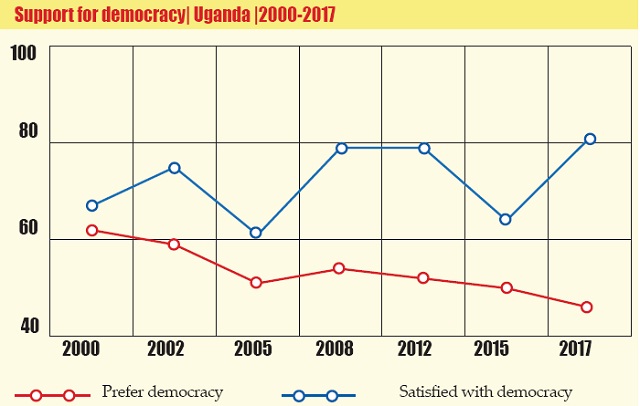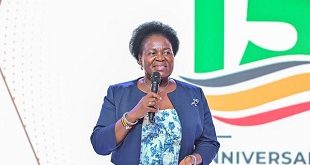
Growing dissatisfaction
The Afrobarometer survey shows that the gap between Ugandans who are consistently more likely to prefer democracy and those who are satisfied with the way their democracy is actually working has never been wider than it is today. It was just five percentage points in 2000 but it is 35 percentage points today. But then it fluctuates; so it is almost impossible to predict. Researchers found the 10 point difference in 2005 grew to 25 points after the 2006 elections and the 14 point-gap in 2015 grew to 34 points after the 2016 elections.
Reacting to survey results on Nov.16, Prof. Gerald Kagambirwe Karyeija, a Political and Administrative Sciences Lecturer at Uganda Management Institute said considering what is going on in the country now, if a similar survey is conducted now, the gap between supply and demand for democracy would be as high as 50 percentage points – even if it’s more than a year after elections. Karyeija says the fluctuations happen because “those in charge of championing democracy in this country don’t exemplify it”.
“That’s why you see the number of those unsatisfied with how democracy is working tend to increase after elections because what they experience in the process shatters their hopes,” he says.
“Democracy in Uganda is rotating in one place and not moving ahead,” he adds, “It’s high time the country redefined democracy in our own context as Uganda and that shouldn’t in any way depart fundamentally from what is globally understood.”
For him, commitment to democracy calls for champions so that what they say and do reflects democratic values. He says the champions must abstain from excesses that conflict with democracy, however much they find pleasure in them.
Karyeija said procedural democracy; meaning repetitive elections, strongly ingrains democracy and should, therefore be appreciated. He explains that elections are the least part of what democracy is about and the substantive issues of human rights and dignity constitute democracy.
“That’s why whether elections are free and fair or not, there’s a certain point when people will say whether you’ve been winning elections or not your time is up,” he says.
Human Rights activist Livingstone Sewanyana agrees. For him, the challenges that the country is facing is because leaders have not conceptualized what democracy is about. So they tend to persecute those with dissenting views.
 The Independent Uganda: You get the Truth we Pay the Price
The Independent Uganda: You get the Truth we Pay the Price



